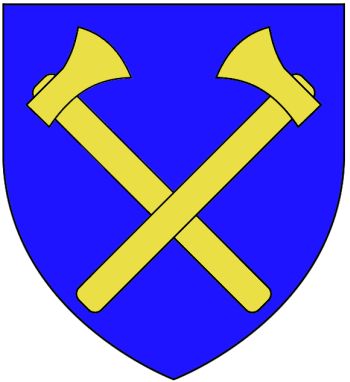Saint Helier: Difference between revisions
Jump to navigation
Jump to search
Knorrepoes (talk | contribs) m (Text replacement - ".jpg|center]] ====Official blazon====" to ".jpg|center|Arms of {{PAGENAME}}]] ====Official blazon====") |
Knorrepoes (talk | contribs) m (Text replacement - "====Origin/meaning====" to "===Origin/meaning===") |
||
| Line 11: | Line 11: | ||
====Official blazon==== | ====Official blazon==== | ||
===Origin/meaning=== | |||
The arms of the Parish of St. Helier show two crossed axes on a blue background. Helier (in Latin: Helerius) was born in [[Tongeren]] in Belgium, probably between 510 and 520 AD. He probably arrived in Jersey around 535 - 545 AD. He was martyred in approximately 550-560 AD. He died during a Viking raid by decapitation. Hence the axe as his symbol. | The arms of the Parish of St. Helier show two crossed axes on a blue background. Helier (in Latin: Helerius) was born in [[Tongeren]] in Belgium, probably between 510 and 520 AD. He probably arrived in Jersey around 535 - 545 AD. He was martyred in approximately 550-560 AD. He died during a Viking raid by decapitation. Hence the axe as his symbol. | ||
Revision as of 18:11, 22 June 2017
| Heraldry of the World Civic heraldry of the United Kingdom > Channel Islands |
SAINT HELIER
Official blazon
Origin/meaning
The arms of the Parish of St. Helier show two crossed axes on a blue background. Helier (in Latin: Helerius) was born in Tongeren in Belgium, probably between 510 and 520 AD. He probably arrived in Jersey around 535 - 545 AD. He was martyred in approximately 550-560 AD. He died during a Viking raid by decapitation. Hence the axe as his symbol.
Contact and Support
Partners:
Your logo here ?
Contact us
© since 1995, Heraldry of the World, Ralf Hartemink 
Index of the site










